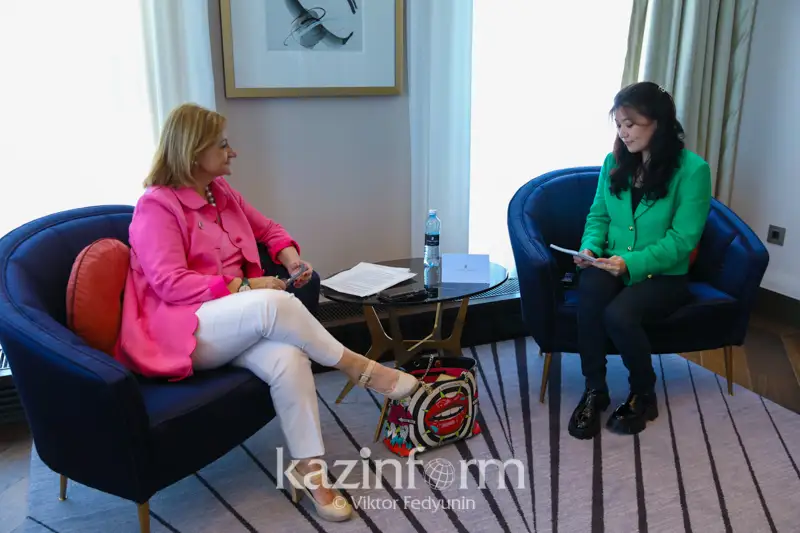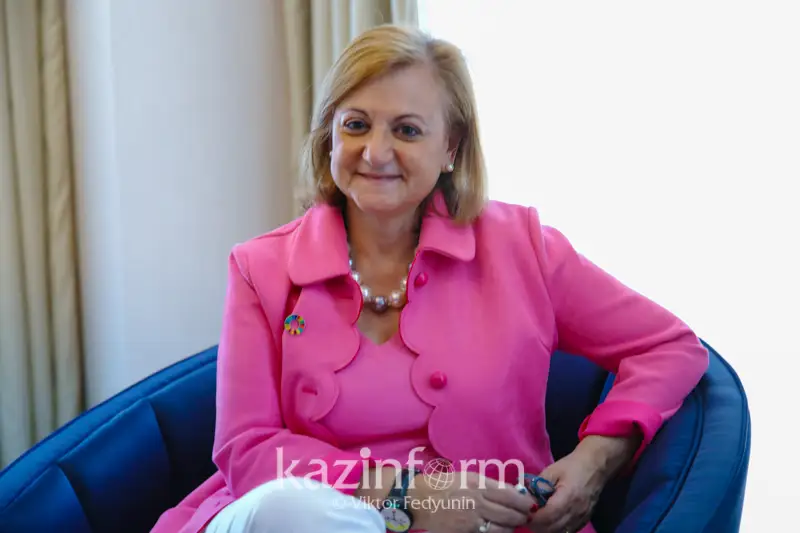Cristina Gallach on Kazakh-Spanish relations: The impact of the pandemic, tourism opportunities and about the political reforms

Madam Deputy Minister, could You tell us how the cooperation between Kazakhstan and Spain is developing today?
Cooperation between Spain and Kazakhstan already has a long history that goes back many years when we established diplomatic relations and developed very good trade and investment cooperation. At the same time, I think, we have developed fruitful people-to-people contacts with Kazakh visitors coming to Spain for tourism, business and studies. I think we have a very good historic line of cooperation. Unfortunately, for the last five years our trade relationship has become imbalanced. And we hope that once international mobility restarts and with the new important economic sectors that are going to be very much at the center of the recovery, we will be able to rebalance our trade relations and to deepen people-to-people cooperation and contacts.
How the coronavirus pandemic affected the volume of trade, investment sectors and, in general, economic relations between our countries?
Pandemic has affected… The fact - that we have no mobility. I will give you an example - just before the pandemic there were very advanced talks to establish some direct flights between our countries. Then the pandemic basically put on hold this decision. But the possibility of establishing some direct flights remains high in our agenda.
The pandemic has meant that we not only couldn’t fly but also the exports somehow declined. Spain continues to import oil. But Spanish companies’ presence here somehow went down. After the pandemic we have to ensure that we can open up and find new sectors of common interest. There are sectors which are very interesting, where Spanish companies are very competitive internationally, such as green energies, eco-friendly transport, management of water and sanitation, hospital construction and equipment, digitalization, smart cities, and food processing and food import. We have already quite important investments in trains, chemical industry and fashion. So, there are many areas in which we would like to explore opportunities for strengthening bilateral business cooperation.
I can say the same about our cultural relations. For example - teaching the Spanish language, which we know, is much appreciated here. And hopefully increase as well the number of Kazakh students in Spanish universities. We already have some very good Spanish professors in Kazakh universities and an important number of Kazakh students studying in our country, but we keep working to continue to increase these figures. There are many areas of our cooperation and we look forward to work with the Government to deepen it.
You have mentioned the direct flight between Spain and Kazakhstan. When this will happen?
I do not know. I hope as soon as possible. Because I know how much it will positively impact in exchanges. You know, to come here I had to stop in Frankfurt and Istanbul, so that was a nice flight but too long. On my way back I only stopped in Frankfurt. We really think direct flights can make a big change. We will be looking at how we can help Kazakh and Spanish airlines to be able to reach an agreement on this critical matter.
What Spanish companies work in Kazakhstan nowadays and in what sphere mostly?
We have a number of companies working, in particular in the railway sector - Talgo is one of these companies. We have another company - CAF which is very experienced in electric light trains and trams. There is an important bid for the construction of the light tram in Almaty. And we are going to work precisely on that. There are big Spanish firms present in important sectors such as aviation, chemical industry, engineering, IT and digitalization, textile and fashion, etc. We cover a variety of sectors and our ambition is to consolidate the presence, but also expand to new sectors.
How many Kazakhstan citizens did travel to Spain - before and after the pandemic? Has the number of visas issued for Kazakh citizens decreased?

In 2018 we issued around 13,000 visas. And in 2019 we issued almost 17,000, so there was an important increase. Unfortunately, last year because of the pandemic there was a 80% fall in the visas because of the restrictions. We hope to overcome it as soon as possible and hopefully to increase the number of visas. We know that the Kazakh travelers like Spain and enjoy our beaches, cultural heritage, food, shopping and tourism infrastructure. We will be working hard to attract once again the Kazakh visitors to Spain - and not only for holidays, but also for business, so we can deepen our economic relations.
Please comment on the education possibilities in Spain and we know that Kazakhstan’s citizen also prefer to study in Spain.
We hope to attract more students once we recover the mobility. There are several sectors very attractive for foreign students: one is engineering and architecture, second is business administration, third is medicine and biotechnology. I think, probably these sectors could be the most attractive for Kazakh students. Spain has a very good network of public and private universities. Also many of them offer programs in English. Knowing the Spanish language is always necessary and positive but not a must. We will be working on that.
What is the situation with coronavirus in Spain today? What could You tell us about the development of tourism in Spain and how the pandemic will change travel, in your opinion?
We have suffered three waves. We were one of the first countries in Europe to be hit by the pandemic. Very early, already in March (2020), when some countries locked down because they feared, we had to lock down because we were already hit with many cases. Now we see things improving for two reasons: the better management of the cases and because of the vaccination process. We are vaccinating at a very high rate, we hope to reach 70% of all the Spanish population vaccinated by August.
And that will mean a major change. At the same time because the tourism sector is so important, 13% of our GDP is generated through the tourism industry. What we see now is that some corridors have been established, some areas of safe tourism have been established. In particular, the Canary and Balearic islands, areas in which tourism accounts for almost 40% of the economy. We hope to be ready by June -early July to receive as many tourists as possible but in safety. We are also working with the European Union member states, to agree on a sanitary passport that will show that the traveler has already been vaccinated, has a recent PCR-test or has passed the coronavirus infection.
Last year, some areas of Spain were doing alright during summer, because there was more internal tourism. This year we expect to recover international tourists. We are talking about starting with EU countries and then progressively open up to those countries who offer better rates of immunization. It’s a big task and we are collaborating very closely with the private sector, hotels and airlines. On Monday and Tuesday ‘The International Tourism Fair’ which is a major event, will already take place in Madrid. Last year and in January-February of 2021 this event couldn’t happen. This is a signal of determination to progressively open through specific procedures.
How Kazakhstan and Spain develop cultural cooperation? Do the Spanish cultural or language centers work in our country?
We know about Kazakhstan because the Kazakh reputation is positive. Your Independence now dates 30 years and the role of Kazakhstan in the world politics is well known. Our bilateral relations are quite dynamic. I think that Spain is a country that although it’s far away, it’s quite close emotionally. I think we can do more and work more together. I just visited the Astana Opera, it was so beautiful. Spain has wonderful cultural activities. I think that we just need to work more together and make our respective cultural activities more known. So that our people understand more about each other. Our cooperation has a great potential.
There is a growing appetite for learning Spanish in the Kazakh society, so we keep working to increase the number of Spanish teachers in Kazakh universities. At this very moment we do not think it is feasible for budgetary reasons to open a full-fledged Cervantes Institute in Kazakhstan. But we are convinced that if we find the right sponsorships from the private sector, we will be able to open «Aulas Cervantes» in some universities, which is a smaller format still very good way to learn and teach our language. Hopefully, we can get this off the ground rather soon.
How Spain assesses the political reforms announced by Kazakhstan’s President Kassym-Jomart Tokayev?

We are following the political reforms very closely. There is one that we would like to underline, which is the decision to abolish the death penalty. This is a fundamental step which we praise very much. Spain is part, like Kazakhstan, to the International Commission against the Death Penalty. Second, we have followed reforms such as the one that aims at increasing the political representation of women and young people. This is very important too. The reduction of the threshold for representation in Parliament (from 7% to 5%) is also a positive step, but we encourage Kazakh authorities to keep opening up to more inclusive representation. We also praise the national surveillance mechanism put in place against torture.
For us what is very important is to see this dynamism to continue. Reforms are important to take into account what society demands to be more inclusive, more open and transparent. We think that the determination showed by the leadership of the country in advancing in this area is fundamental.
Madam Deputy Minster, Thank You so much for meeting with us. Wish You all the best!